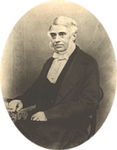
By Theodore Epp
1 John 2:7-11
The statements concerning the old and the new commandment sound paradoxical. They can be readily reconciled, however. The Apostle John wrote here, as 1 John 2:9-11 shows, about our love for one another.
In a sense this is not a new commandment; it is an old one that goes back to the time when God made man in His own image. Since man was made in the image of God, love was part of the expression of his life. It is old also in the sense that the Old Testament Law was summarized in the commands to love God and love our neighbor.
From all of this one might conclude that there is nothing new about this commandment at all, and yet there is an aspect that is new. We are given the clue to this in the expression, "The darkness is past, and the true light now shineth" (v. 8). Here again the present tense was used, and the translation could read: "The darkness is passing, and the true light is now shining."
Under the Old Testament Law, people were commanded to love, but the Law did not provide them with the ability to obey. Only as the Holy Spirit could get control of individual hearts was this possible.
"This is my commandment, That ye love one another, as I have loved you" (John 15:12).






